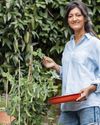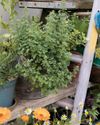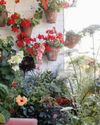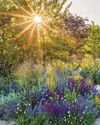
The three best things in life are fresh air, sunshine and food - and the good news is, you don't need a big garden or even a patch of soil to enjoy them.
In part two of this series I'll explain how to keep an edible garden in pots growing happily, including the jobs to do this month to keep your pots going, how to get the most out of your space and what to pick, when and how, as summer progresses. While some edible containers produce more to pick the more that you pick them, others will be finishing for this year and ready to be swapped out for something else.
If you were inspired to start a small space edible garden by the first part of this series, you'll already have some of the plants ready to go. If not, it's not too late to get going now.
Midsummer sowing and growing
Keep the harvests coming by getting the next wave of crops up and running
If you started your edible garden in pots with the first part of this series back in April, you'll have the apple tree, blackcurrant and fresh herbs in pots and on the go. If not, plant them now using containers large enough for their roots. Peat-free multi-purpose compost is fine for most herbs, but for woody plants you'll need a soil-based mix to support their long-term growing needs.
Chillies and aubergines are classic late-summer harvests and both grow brilliantly in pots. They do need to be sown much earlier than June, though, so if you haven't already got them on the go, look out for young plants at garden centres - by this time of year they will be available in small pots. Wait until after the last frost then harden them off by putting them outside in the daytime for a few days before planting them in your pots.
Bu hikaye BBC Gardeners World dergisinin June 2024 sayısından alınmıştır.
Start your 7-day Magzter GOLD free trial to access thousands of curated premium stories, and 9,000+ magazines and newspapers.
Already a subscriber ? Giriş Yap
Bu hikaye BBC Gardeners World dergisinin June 2024 sayısından alınmıştır.
Start your 7-day Magzter GOLD free trial to access thousands of curated premium stories, and 9,000+ magazines and newspapers.
Already a subscriber? Giriş Yap

A new plot for tasty crops
Taking on a new allotment needn't be hard work. By simply following a few easy tips you can have bumper crops in no time, just like Alessandro Vitale

We love July
July is an island floating between the joy of June and the slightly fatigued month of August. It's a grown-up month: the year has shrugged off its adolescent exuberances, the weather is (hopefully) warm enough for ice cream to be one of your five a day, the sea should be swimmable without (too much) danger of hypothermia and thoughts will be of holiday shenanigans and family barbecues. School's out this month, the next tranche of glorious summer colour is washing across our borders and it's my birthday. Lots of reasons to give three rousing cheers for July!

YOUR PRUNING MONTH
Now, at the height of summer, Frances Tophill shows how to boost your plants' health and productivity with a timely cut

Hassle-free harvests
Flowers are out in abundance this month and for Jack Wallington, many of these blooms make delicious, low-effort pickings

Bite-sized bounties
Glorious doorstep harvests can easily turn into gluts, so let Rukmini Iyer's recipes help you savour every last bit

Upcycled outdoor living
Create unique and stylish garden features for minimal cost using reclaimed materials and simple DIY skills. Helen Riches shares four step-by-step projects and more inspiring eco tips

Secrets of a COLOURFUL GARDEN
Buildings and landscapes can play a vital role in supercharging your space, as Nick Bailey demonstrates

Greening up a city balcony
Looking for sustainable, small-space gardening ideas? Take inspiration from Oliver Hymans' transformed balcony garden in north-east London - now a lush, green haven for humans and wildlife

The dry and mighty garden
As we adapt our gardens to a more volatile climate, Alan Titchmarsh reveals how to create a drought-tolerant plot and picks his top plant performers

Nature knows best
Carol Klein explains how to choose plants for specific growing conditions, based on what has naturally adapted to thrive there